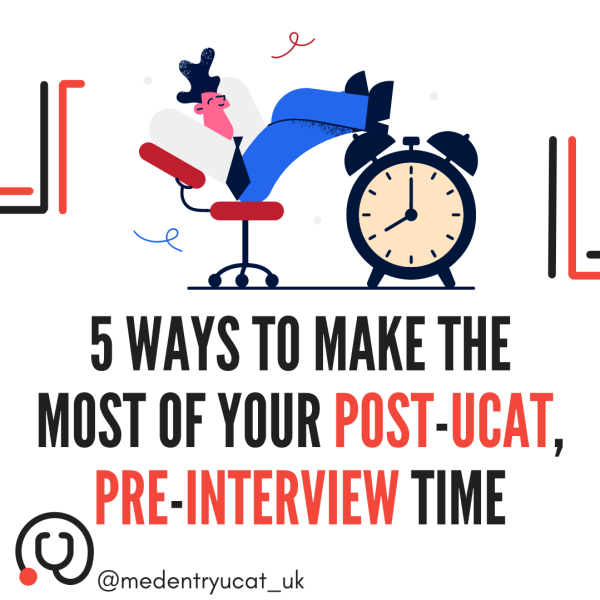5 Ways to Make the Most of Your Post-UCAT Pre-Interview Time

11 months ago by Stan
If you have completed your UCAT exam, congratulations on getting through the marathon that it is! While you can relax a little, now is not the time to be sitting back and relaxing (sadly). Instead, you should start planning for applications and interviews!
Here are five tips to make the most of your post-UCAT, pre-interview time:
1. Pump up your Grades
Before UCAT, chances are your other school or university study slipped a little (that’s okay, you were busy!). However, now you need to pick it back up and work hard! Academic results are also important when applying for medicine.
Applicants with predicted grades lower than the entry requirement will most likely get an automatic rejection (A-Level standard offer grades range from A*A*A to AAB).
So focus on pumping up your grades – you’re in the home stretch after all!
2. Decide where you will apply
You should take some time to think about where you will apply to study medicine. MedEntry recommends applying strategically to give yourself the best chance of getting into medicine. Our blog series will help you do this:
- Applying to Medical School Strategically: Part 1 - Using Your UCAT Score
- Applying to Medical School Strategically: Part 2 - Where to Apply with a High UCAT Score
- Applying to Medical School Strategically: Part 3 – Where to Apply with a Good UCAT Score
- Applying to Medical School Strategically: Part 4 - Where to Apply with an Average UCAT Score
- Applying to Medical School Strategically: Part 5 - Where to Apply with a Low UCAT Scor
- Applying to Dental School Strategically Part 1: Where to Apply with a High UCAT Score
- Applying to Dental School Strategically Part 2: Where to Apply with a Medium UCAT Score
- Applying to Dental School Strategically Part 3: Where to Apply with a Low UCAT Score
There are lots of factors to consider when choosing a medical school. For advice and help making your decision, check out our blog.
Once you have decided on your preferred universities, research them. Have a look at the university’s website and make some notes. This will help you answer the inevitable question “Why do you want to study here?”. It will also help you seek out relevant opportunities to make you appealing in the interview stage.
3. Plan your applications
When applying to medical school, you will need to apply to UCAS and submit a personal statement. Some universities use personal statement during the selection process, or as a prompt for interviews. It is therefore important to craft a powerful personal statement. MedEntry provides a written application guide and review service to help.
Remember, the closing date for applications is 15 October.
4. Seek out relevant experiences
There are certain experiences that universities look upon favourably in interviews and applications: wider reading, work experience in a health-related field, and extra-curricular activities (such as sport and music) that demonstrate you are a well-rounded individual. Consider your own experiences, and in what areas you may need to improve.
For example, volunteering is important. At some point in an interview you are going to a variation of “I want to help people” and if you’re not able to back that up with some real action, the claim might seem a little empty. So if you’re not already volunteering, now is the time to start! There are lots of fantastic organisations out there – what’s available will depend on your area. Some places you can look include Non-Government Organisations (NGOs), care homes, hospices, community centres and refugee organisations.
5. Work out your plan B
No one likes to consider the possibility of not getting into medicine, but it is important. The truth is many applicants don’t get into medicine on their first try, and even if you’re an exceptional applicant, you do not have total control over what happens on interview day any more than you have total control over what happens on UCAT test day.
So work out your plan B and make it a plan B you can really look forward to! Having a plan B that you actually like will remove just a little of the pressure and you may even be asked about it in interviews (For example, interviewers may ask questions such as “What would you do if you did not get any offers this year?”)
For school leavers, plan B could look like a gap year where you work, travel, and then reapply for medicine. If your ultimate goal is to study medicine, it is important to note Graduate-Entry Medicine is far more competitive and costly than undergraduate medicine.
Hopefully this blog has given you some guidance as to how best to make use of this post-UCAT, pre-interview time!


